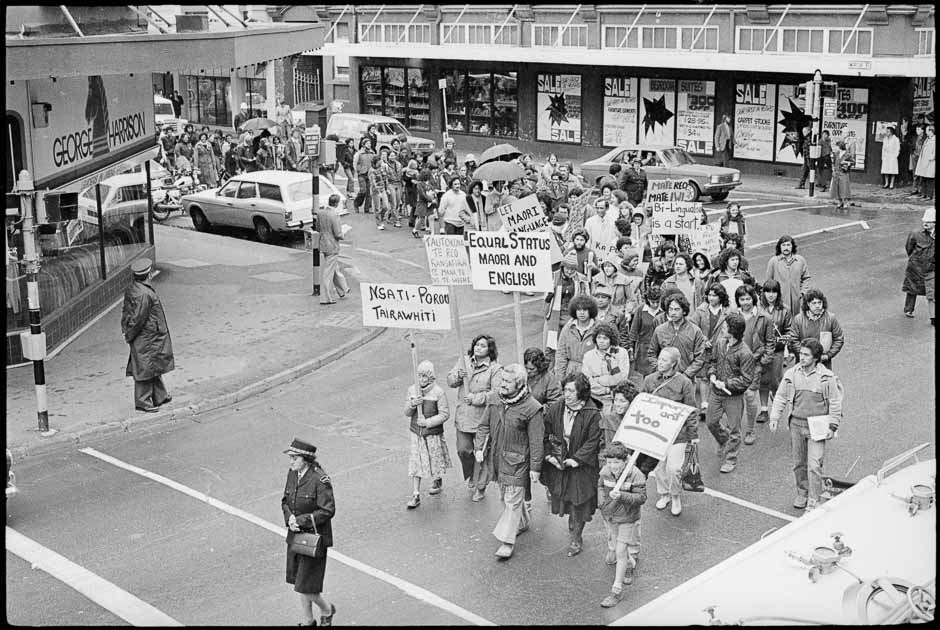Māori Language Week protest march
What do you know?
Further background- In 1974 the Maori Affairs Act under Labour established Maori as the official language of the Maori people of NZ but conferred no rights to Maori or obligations on the Crown. Although it was later in the Mihaka cases, found to be toothless it was a significant symbolic step to later official National Language status.
In the late 1970s Ringa Mangu Nathan Mihaka or Dun Mihaka a Wellington Māori activist sought to use the new Act to conduct his defence in a series of court cases. He was refused permission in the District Court , High Court and in 1979 the Court of Appeal and it was this 1979 decision caused a storm of protest in 1980 prompting strong Maori protests and marches and calls by Te Reo Maori Soc and the Maori Grads for Maori to be made an official national language to recognise such rights. While not a member of Te Reo Maori Society VUW Dunn and Dianne Prince were always supportive of TRMs Hui activities, actions,and debates on the status of the language. Had Dunn not tested the law on the status of the language so publicly it is very unlikely that there would have been such a groundswell of support for legal status for te reo as the 1985 Waitangi Tribunal noted .
in 1980 then with support of Te Reo Maori lawyers Whai Dewes and Rawiri Rangitauira, who produced possible draft language Bills, Labour Maori members especially Whetu Tirikatene introduced several draft official language bills to parliament between 1980 and 1985 . All were defeated by the National Government then in power but Labours commitment to official language status was secure and when they came to power in 1986 and following the 1985 Waitangi Tribunal report they immediately passed the 1987 Official Maori Language Bill and established the Taura Whiri i te Reo Maori (Maori Language Commission)
Source: McCaffery,J. ( 2014) Biliteracy at Richmond Road School. Draft PhD material. Please acknowledge
In the Teachers Colleges, Maori Studies was introduced in the mid 1960s into the Wellington and Auckland as part of their Social Studies Departments.. In 1963 Wellington Teachers College (WTC) appointed Barry Metcalfe to teach Polynesian Studies. As WTC students of the time, we knew that as Barry was a Pakeha, Polynesian Studies was actually planned by Des Kelly HOD as a safe way in which Barry could safely culturally and politically teach Maori Studies. Barry was bilingual and biliterate, spoke fluent Maori, composed and published and preformed traditional song poetry in Maori. He had an enormous passion for the language, archeology, arts, kapa haka, drama. John and Teremoana Hodges from Brandon Intermediate Porirua came to run the Poly music of the Club and after 1968 Keri Kaa the Maori section with Metcalfe and the newly appointed Tipene O’Regan. In 1968 Tipene ( Steve) O’Regan was appointed lecturer in NZ Studies but actually formed an enduring partnership with Metcalf and their Maori, Pacific and Pakeha students. Both were hugely influential in my own and many others at WTC Teacher Education forming and sustaining a very active Maori Club in partnership with Te Reo Maori Society at VUW for many years well beyond 1972 when Metcalfe moved on to other ventures and Keri Kaa became lecturer followed later by the additional appointment of Amster Reedy. Meanwhile from 1968 while O’Regan was always the historian and academic; Metcalfe was the community activist in partnership with communites and their marae. Their positive enthusiasm for te reo me ona tikanga and activist influence on future primary teachers proved to be dynamic indeed. It was of course Tipene, who was to become my own mentor in both academic and Maori matters for most of the rest of my academic life. Probably of most dramatic significance was our joint work on the history and movement of Ngai Tahu through the Wellington region.
None of these developments however were easily won and from the inside it seemed and still seems, that each was almost a repeat of the now familiar historical struggle for acceptance and inclusion of te reo Maori over prejudice and ignorance that had been running for so long. The pressure was however expanding rapidly and between 1968- 1978 as we know it finally exploded into youth activism on the streets, in the media, at parliament and on marae.
Ref. McCaffery, J. ( 2013) Biliteracy at Richmond Road School. PhD draft material. Please acknowledge source


Community contributions